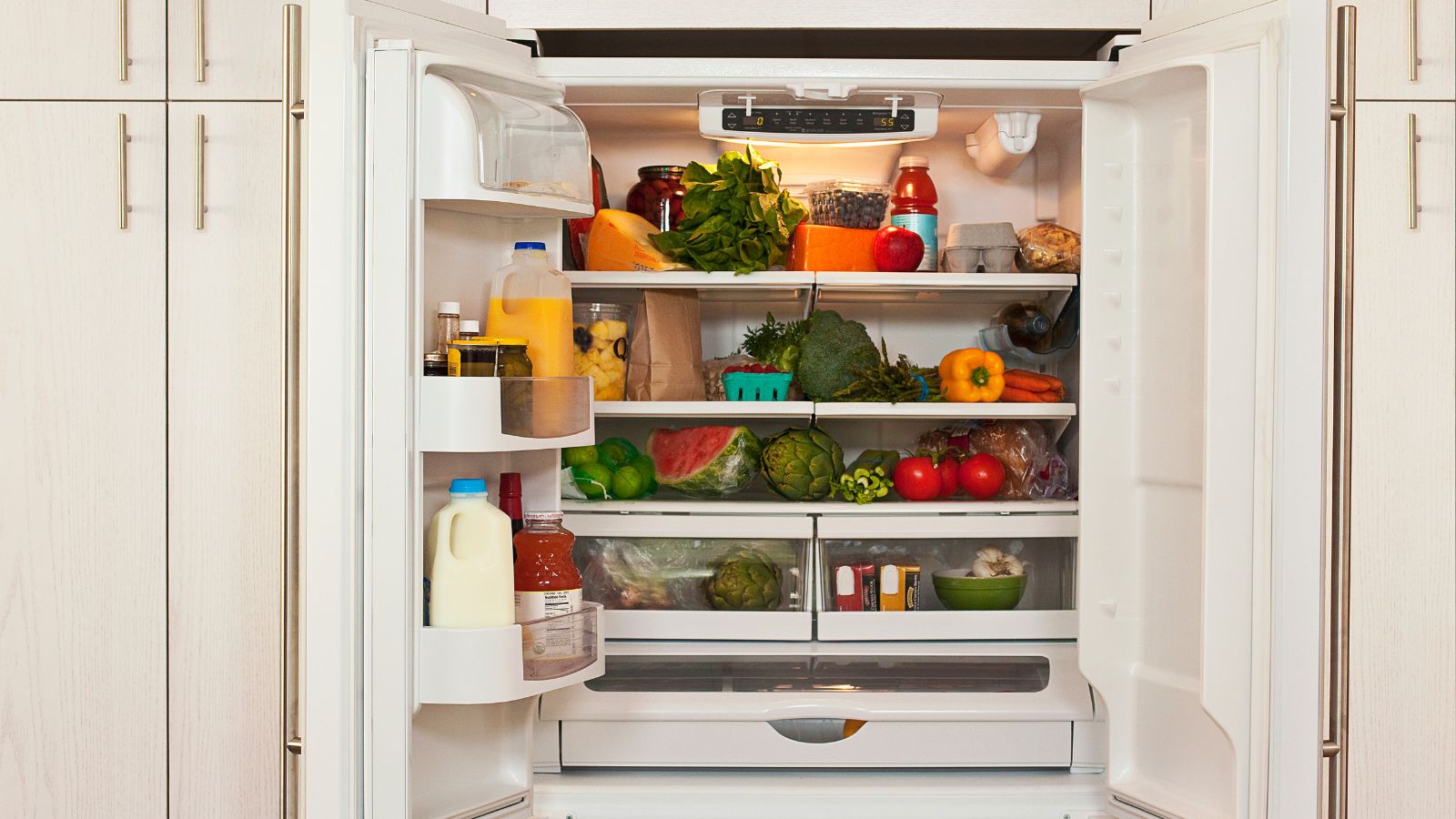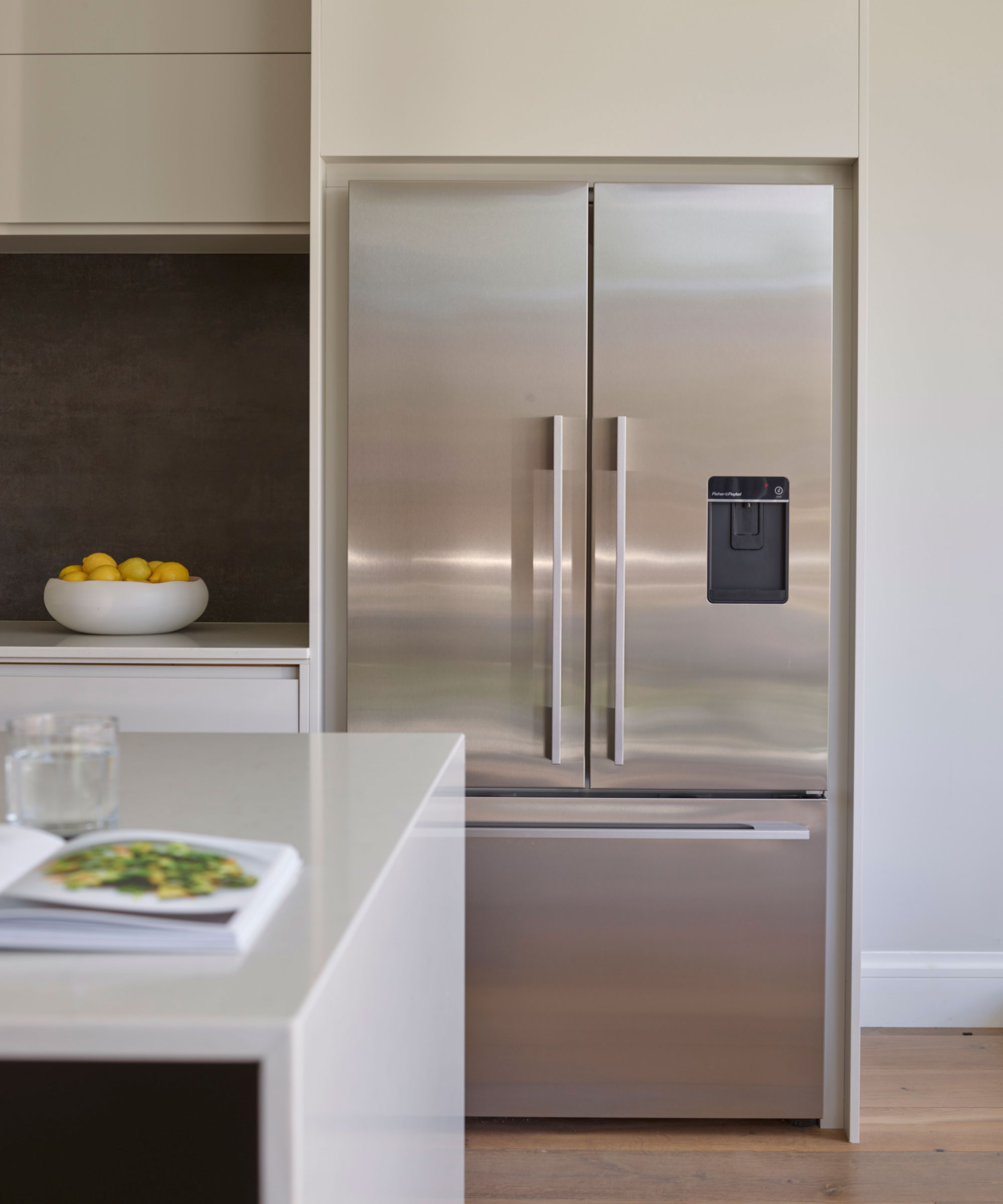8 things you shouldn't store in a refrigerator door – according to chefs
Keep your fridge neat and your food safe by storing these eight items elsewhere


A refrigerator door may seem like a good catch-all, but there are several items you should never store in this perilous spot, chefs say.
When organizing your refrigerator, storing these eight items in your door could compromise your food hygiene, increasing the risk of getting sick.
We asked chefs and professional organizers to explain where these eight items are better stored, and why it is so important to get it right.
Things you shouldn’t store in a refrigerator door
Of all the refrigerator organizing mistakes to avoid, keeping these eight items out of your fridge door is the most important:

1. Dairy products
Organizing your kitchen like a chef means prioritizing food hygiene above all else, even if it means going against what you already know. Many of us likely store our milk cartons in the fridge door in easy reach, for instance, but chefs warn that this could speed up the spoiling process:
‘The fridge door is the warmest part of the fridge due to the temperature fluctuations it experiences,’ Jecca Chantilly, food blogger and recipe developer begins. ‘Milk, eggs, and other dairy products are highly sensitive to temperature changes, which can cause them to spoil faster.
‘These products should be stored towards the back of the bottom shelf, which is generally the coldest part of the fridge,’ Jecca explains. ‘The back of the bottom shelf retains the most consistent temperature, making it ideal for items that are sensitive to temperature changes.’

Jecca Chantilly is a food blogger from Queens, NYC, sharing recipes and her love of food with her readers.
2. Fresh produce
There are plenty of ways to make your fresh produce last longer, from the best way to wash fruit and produce to prevent spoilage, and storing them correctly. This means keeping them out of the door and in a drawer to prevent fridge burn or accidental damage from falling, says Chef Sebastien Canonne, co-founder and culinary EVP at EQUII:
‘To keep produce fresh, we sort it out in buckets with a sheet of paper towel in the bottom. For example one for peppers, one for tomatoes, one for onions, shallots, and garlic.
‘We always store produce in the drawers so the fridge temperature doesn’t burn them,’ he explains.

Sébastien Canonne, M.O.F. is a French master pastry chef and co-founder of the French Pastry School in Chicago. In 2004, he earned the elite title of Meilleur Ouvrier de France, and in 2015 was named a Knight by the French government in the National Order of the Legion of Honour.
3. Leftovers
Whether cleaning up after a dinner party or stowing away the remains of a family meal, leftovers need to be stored correctly to prevent bacterial contamination and food poisoning, Jecca Chantilly, food blogger reminds us. This usually means keeping them out of the fluctuating fridge door:
‘The rising and falling temperatures from the fridge doors can cause ready-to-eat meals, cooked food, and leftovers to spoil faster. Instead, they should be stored on the top shelf of the refrigerator,’ she says. ‘While the temperatures at the top shelf are not as cold as the bottom shelf of the fridge, it is the most ideal place to prevent potential contamination from other ingredients that may drip down from above.’

These smaller glass storage boxes are an eco-alternative for leftovers that keep food fresher for longer.
4. Carbonated sodas
To prevent spilling, many of us store our half-opened drink bottles and sodas in the fridge door. However, the frequent swinging open and closed can fizz up the drinks making them awkward to open, reveals Taya Wright, lead organizer and owner at Just Organized by Taya.
‘Storing carbonated beverages in the door subjects them to constant movement, potentially causing pressure changes inside the can or bottle. This can lead to leakage or even a mini explosion when you pop them open.
‘Keep your carbonated beverages in the main part of the fridge where they can sit still, reducing the risk of accidental fizz-over when opened.’
5. Eggs
Eggs are some of the more delicate items in our fridges that need a more secure home than our fridge doors – especially if you don't want them sunny-side-up on your kitchen floor, Chef Sebastien Canonne, culinary EVP suggests.
‘It is best to put eggs in one of those special egg trays that often come with your refrigerator and work fabulously,’ he adds.
6. Nut butters
There are several surprising foods to store in a refrigerator, including nut butter, such as peanut and almond butter – however, none of them should go in the fridge door, Taya Wright, professional organizer, says.
‘Nut butters like almond or peanut butter tend to separate at inconsistent temperatures. When stored in the fridge door, they can become either too hard or too oily, making them difficult to spread.
‘For a better texture and easier spreadability, store nut butter in a stable temperature zone, like the middle shelf in the main body of the fridge.’
7. Raw meat
Meat is one of the biggest concerns for food safety in a kitchen, and it should never be stored in a fridge door to keep it at a safe temperature and prevent juices from flinging around your fridge as the door slams shut.
Instead, raw meat should be packaged securely in a sealed container with the expiry date written clearly on it and left on the bottom shelf of your fridge where leaks can’t contaminate any food below it.
8. Anything made of glass
The movement of a fridge door means bottles and jars are prone to sliding around and falling over, meaning it is a good idea to leave glass objects elsewhere, says Millie Hurst, Solved section editor for Homes & Gardens.
‘Smaller glass jars and bottles may be okay when squashed in and held in place with other items,’ she says, ’but it is best not to take the risk of one falling and shattering on your kitchen floor.
‘Anything stored in the fridge door should, ideally, be bottom-heavy, to prevent toppling and sliding.’

Millie Hurst is Section Editor at Homes & Gardens, overseeing the Solved section, which provides readers with practical advice for their homes. Millie has written about and tried out countless cleaning and DIY hacks in the six years since she became a journalist, and has worked in both London and New York.
FAQs
Can you keep wine in a fridge door?
Wine is better kept on a stable shelf in a fridge and not in a door as the constant movement can shake the wine up and speed up aging, affecting the taste of the wine and its longevity. Consider using a wine rack in your fridge to keep them stationary and safe on the shelf as it chills.
How do I organize my refrigerator door?
When organizing a fridge door, it is important to avoid placing top heavy items near the front, where they may topple and fall out when the door swings open and closed. Place smaller items at the front of the shelf, with larger, bottom-heavy items such as sauce bottles and condiments at the back of the door shelf. This orientation also helps you to see everything in there, so you don't buy duplicates, and nothing goes bad without your noticing.
Although that list seems to have ruled everything we usually store in fridge doors out, there are some items that are still okay to be stowed away, Jecca Chantilly, food blogger, assures.
‘Items including salad dressings, jams, condiments, and flat beverages are suitable for the fridge door because they contain natural preservatives that allow them to withstand temperature changes,’ she explains – just be sure they are held in place correctly to prevent them falling out.
Sign up to the Homes & Gardens newsletter
Design expertise in your inbox – from inspiring decorating ideas and beautiful celebrity homes to practical gardening advice and shopping round-ups.

Chiana has been at Homes & Gardens for two years and is our resident 'queen' of non-toxic living. She spends most of her time producing content for the Solved section of the website, helping readers get the most out of their homes through clever decluttering, cleaning, and tidying tips. She was named one of Fixr's top home improvement journalists in 2024.
-
 Want to make your home look more charming? These 4 Benjamin Moore exterior shades will up your curb appeal
Want to make your home look more charming? These 4 Benjamin Moore exterior shades will up your curb appealIf you're on the prowl for a new shade to try for the outside of your home, Benjamin Moore has unveiled its most 'charming' colors
By Sophia Pouget de St Victor
-
 There's a rustic cottage hiding on Wayfair – it may seem unorthodox, but this tiny home taps into a growing nomadic trend (and it's under $16K)
There's a rustic cottage hiding on Wayfair – it may seem unorthodox, but this tiny home taps into a growing nomadic trend (and it's under $16K)This 'wonderful' wooden farmhouse perfects a growing trend that's changing how we see our homes – it's tiny, but somehow, it doesn't sacrifice comfort
By Megan Slack